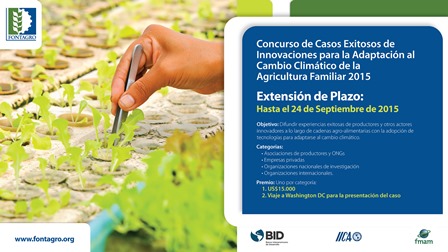
Deadline Extension: Contest for Innovative Cases of Family Farming Adaptation to Climate Change
(Washington DC, July 24, 2015)
FONTAGRO extended the deadline to September 24th, 2015, for profile presentantions to Contest for Innovative Cases of Family Farming Adaptation to Climate Change.
Contest objective
The contest will prioritize innovative cases adapted and implemented by family farms (such as resilient systems, new technologies, and water and soil management) that have helped to increase productive efficiency and reduce vulnerability to climate change.
The innovations should directly involve family farmers, small processors or retailers and can be related to any aspect of the agrifood chain.
Prizes
The cases will be judged by an external panel and the winners (one per category) will be awarded a prize of USD 5000 for distribution among the case participants and USD 10 000 for strengthening the institutional capacity of the winning organizations. In addition, the winning case will be presented by one of the participants at an awards event to be held in Washington, DC in 2016.
The contest will be conducted with resources from FONTAGRO and the Global Environmental Facility (GEF) with support from the Inter-American Development Bank (IDB) and the Inter-American Institute for Cooperation on Agriculture (IICA).
For additional information on the 2015 contest on innovation, see: www.fontagro.minimalart.info/concursos/casosexito
About family farming and climate change
According to the 2014 study, “Agriculture and Future Climate in Latin America and the Caribbean: Systemic Impacts and Potential Responses” published by the Inter-American Development Bank, the main changes in agriculture resulting from the impact of climate change in Latin America and the Caribbean are rising air and soil temperature, decreasing soil humidity, rising sea level and CO2 fertilization. Agriculture is also affected by the intensification of climatic events. From the first half of the 20th century to the first decade of the 21st century, the frequency of floods and droughts in the Americas increased 20 times, with family farmers being the most affected by climate change. They tend to work in precarious conditions and have limited access to technical, financial and knowledge resources. In Latin America and the Caribbean, the family-farming sector includes 17 million small farms and accounts for 40% of total production. Many low cost innovations could improve the yields of small agricultural holdings and help small producers to be more resilient. The resulting increase in income could allow farmers to have more resources for adapting to climate change.
About FONTAGRO
FONTAGRO is a unique regional cooperation mechanism that promotes innovation in family farming, competitiveness and food security. Founded in 1998, FONTAGRO and has 15 member countries that have contributed capital of nearly USD 100 million. It is sponsored by the Inter-American Development Bank (IDB) and the Inter-American Institute for Cooperation in Agriculture (IICA). FONTAGRO’s Technical Administrative Secretariat is located in IDB Headquarters in Washington, DC. FONTAGRO has co-financed 98 projects and initiatives in its member countries for approximately USD 83.7 million, including contributions from other funders and executing agencies. Member countries include : Argentina, Bolivia, Chile, Colombia, Costa Rica, the Dominican Republic, Ecuador, Honduras, Nicaragua, Panama, Paraguay, Peru, Spain, Uruguay and Venezuela.
Contacts:
Carina Carrasco / Communications Adviser, FONTAGRO
Telephone: +1202 623 3038/+1202 716 3590. Email: ccarrasco@iadb.org
Luis Opazo / Head of Communications, INIA Chile
Email: lopazo@inia.cl
Website: www.fontagro.minimalart.info/www.inia.cl
References:
#symposium #climatechange #adaptation #temperature #air #soil #fertilization #innovation #LatinAmerica #Caribbean #Chile #Workshop
#agriculture #familyfarming #farrmers #foodsecurity #projects #food #degradation #contamination #deforestation #desertification #rural #crop #FONTAGRO #IICA #IADB #GEF
